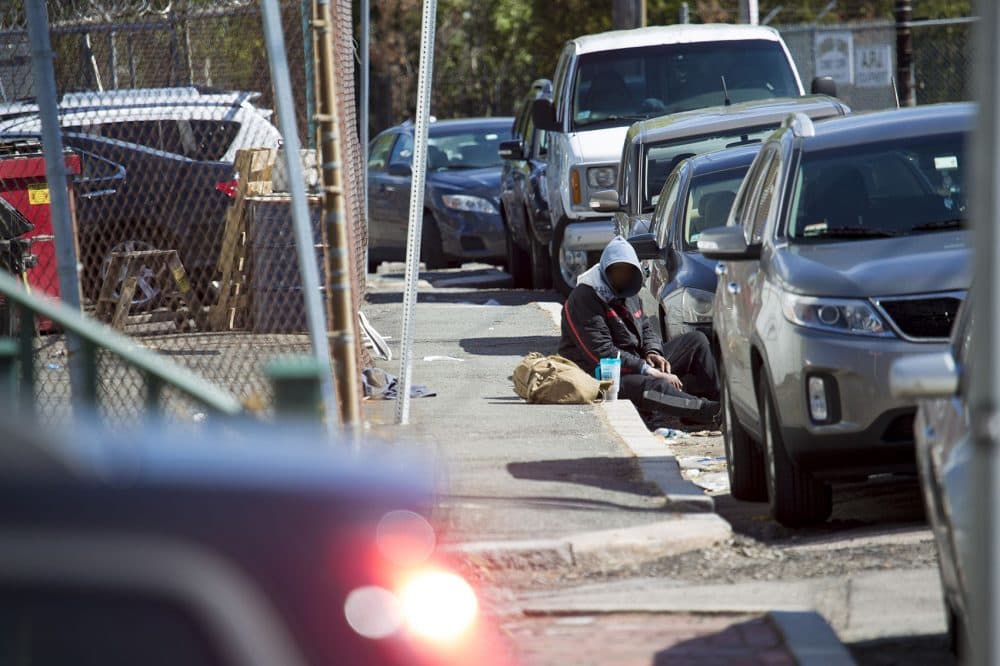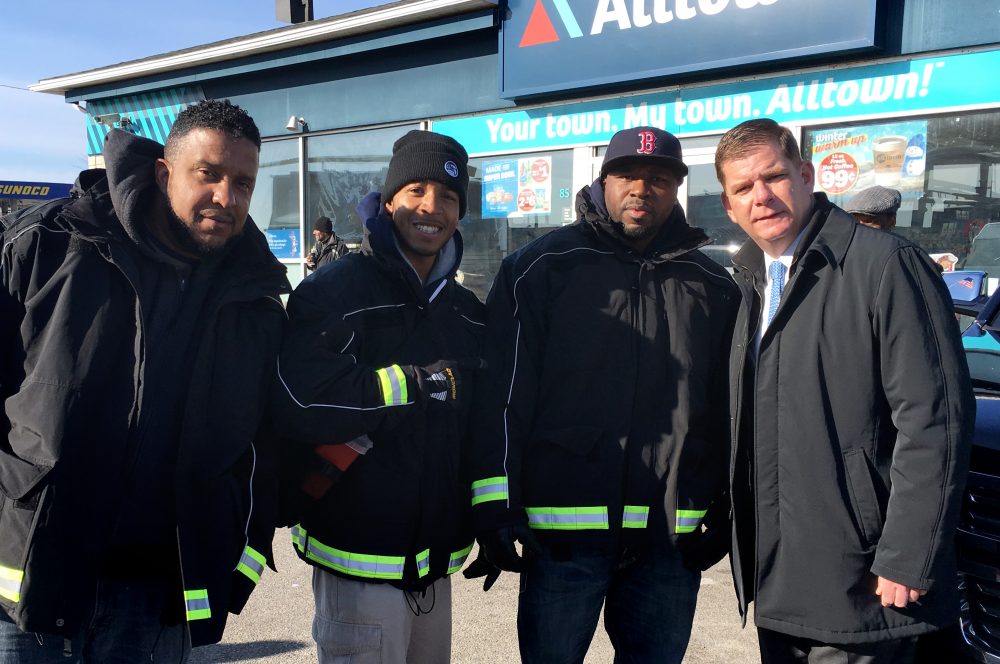Advertisement
How Walsh's Opioid Outreach Program Is Working, 6 Months In
Resume
Boston Mayor Marty Walsh walked through a city neighborhood this week that's been the subject of a series of meetings because of the overt signs of social problems there.
At the intersection of Massachusetts Avenue and Melnea Cass Boulevard, the hub of what was once dubbed "Methadone Mile" but the mayor now calls "Recovery Road," people crowd. Many people come to this neighborhood for social services, primarily substance use treatment, and they are eager to talk.
"Aren't you Marty Walsh?" A woman yells. "My friend has a really big crush on you."
The mayor smiles and asks her why she's in the area. She — like many of those waiting to talk with him — is here for substance use treatment.
This is the first time the mayor has walked around the neighborhood with three of the outreach workers he put here six months ago amid complaints about things such as used needles littering the streets and the number of people congregating in this area, many clearly inebriated, openly buying and/or selling drugs — most in desperate need of services.
While many were clearly happy to talk with mayor, several had complaints about things such as the homeless shelters, police officers or the difficulty getting treatment. Jenna, 29, who doesn't want her last name used, says she has been using methadone for more than a year, but programs specifically for women are scarce.
"I'm just waiting for female programming," she tells the mayor. "There are 25 men's programs for every one female program. That's a fact."
There are several treatment programs in the area, as well as halfway houses, two methadone clinics, homeless shelters and busy Boston Medical Center. Despite the array of services, many people tell the mayor about their difficulties finding long-term treatment and so-called "holdings" where people wait after detox for placement in a halfway house or other structured program. Many of those who approach the mayor know that Walsh himself is in recovery. One man, also using methadone to treat his opioid addiction, tells Walsh he's looking for help.
"I don't know how to put it, but when you said you were an alcoholic, I can relate, because I struggle too," the man told Walsh. The mayor asked him if he goes to 12-Step meetings, and he said he wants more intensive treatment.
"I'm trying to get into a program ... anywhere right now," he told the mayor.

Trying to connect people with services is a big part of what the outreach workers do as they canvass the streets carrying large black duffel bags with syringe boxes and other items to pick up the carelessly tossed drug paraphernalia littering the streets.
One of the workers, Bobby Wright, says his job is about connecting with people and not judging them.
"It's all about meeting people where they're at," Wright said. "We work hard to develop relationships."
The Boston Public Health Commission outreach workers walk the neighborhood every day, talking with people, going to meetings at treatment facilities and shelters, speaking with business leaders and others about improving the atmosphere.
Outreach worker Dwayne Brown says they typically work in pairs and approach people gathering in groups.
"We try to engage some of the guys and try to see where we can set them up at — whether they need lunch at the shelter, or even the women here at the women's shelter. Some of the businesses will call us, and they'll let us know: 'We have syringes out here that need to be picked up,' or 'We have a person who's distraught.' Each day is a little bit different," Brown said.
The city is also pairing the workers with workers from other agencies. City health officials say the outreach workers have connected more than 600 people with services in less than six months, and the city says the workers were involved with reversing more than two dozen opioid overdoses.
Mayor Walsh is pleased: "They're clearly making an impact and building relationships up," he said. "Part of fixing the problem is earning the trust of people, and clearly there is some trust here. You can always see an impact.
"There's so many programs here. It's kind of like it's a melting pot of programs. It's overburdened with programs, which is a tough thing, but it is also a good thing cause there's programs here."
"Part of fixing the problem is earning the trust of people and clearly there is some trust here."
Mayor Marty Walsh
Specifically, the mayor takes issue with some methadone treatment providers. Walsh says he's tried to ask the clinics to provide more comprehensive care.
"I'll say this — I'm speaking not for public health, but I'm speaking as mayor of Boston. The methadone clinic, in my opinion, does not do a good enough job of tracking their clients, of doing the work they're supposed to do, of doing the follow-up long-term care," Walsh said.
"In my opinion, they over-medicate in a lot of ways, they get played," the mayor said. When asked if he's tried to talk with the clinics, he said, "We've tried to — I honestly don't have the patience to work with them."
The two methadone clinics in the area are run by for-profit companies: CRC Health, owned by Acadia Healthcare, and the other is Health Care Resource Center or Community Health Care, Inc. That company also operates nine other clinics in Massachusetts. Vic DiGravio, president of the Association for Behavioral Healthcare, which represents both clinics, says the methadone clinics have been working with several other agencies and business and the mayor's Office of Recovery Services.
"Those organizations have tried to work as closely as possible with City Hall and the Department of Public Health to address neighborhood concerns so I'm not sure what the mayor specifically is referring to," DiGravio said.
Mayor Walsh says he will continue to push for ways to make improvements, and he will use the feedback from this walk with the outreach workers.
"I'll sit down with the budget director today and talk about getting a woman out here on the streets and make sure that's in the budget. Making sure some of the concerns I heard today — I'll go back and work on it and try and make some changes and try to work with public health on it," Walsh said.
Area business leaders say they're cautiously optimistic. Sue Sullivan, executive director of the Newmarket Business Association, a group of the area's business leaders, says the atmosphere appears to improving but more work needs to be done
"There is just too great a number of impacted individuals in one place," Sullivan said. "We need to find someplace for them during the day and a way to get them into the shelters at night."
Mayor Walsh says finding a place for people to go during the day is one of his priorities — and the city is working on several ways to deal with a variety of issues, many fueled by the opioid epidemic.
Boston is the only city in the nation with an Office of Recovery Services. The Boston Public Health Commission trained more than 11,000 people in the past year on how to use the overdose reversal drug Narcan. The city also set up a 3-1-1 hotline to help people get substance use services. There are also added police patrols and a bicycle patrol unit in the neighborhood. Yet, Boston police responded to more than 400 overdoses throughout the city last year — 100 of them were fatal.
This segment aired on March 1, 2017.
